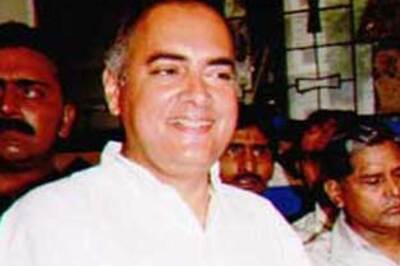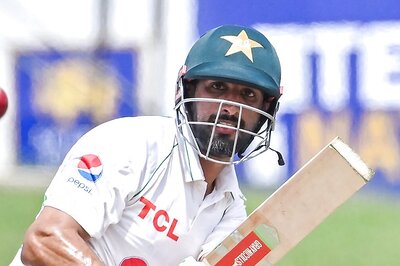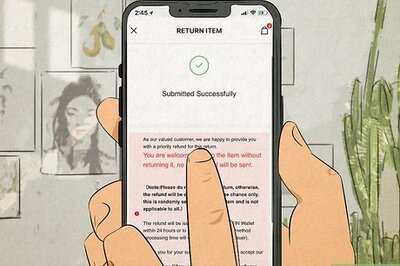
views
Of course, this incident occurred within the realm of entertainment. In the West, the entertainment industry and its stars are believed to be pillars of liberalism. The Celebrity Big Brother episode in the UK proves that's not quite true.
Now, the United States entertainment industry, Hollywood and its cousins, is known for far-left, ultra-liberal views and stances that are extremely politically correct. Now, Indians in America are a minute minority when compared to their counterparts in England, so you'd think they get special treatment in Hollywood.
They do. But not in the way you'd think.
Racism exists in Hollywood even if it may not be overt or even intentional.
Take for instance the case of Kal Penn, who has emerged as the Indian-American face in Hollywood. For Penn, it was tough getting auditions after he completed film school even though his classmates didn't face as much trouble. Finally, he was told he needed to make a change: Change his name from Kalpen Modi to the Americanized Kal Penn. That switch helped his career blossom. But even during that process, his big break came playing Taj, an over-to-top caricature of an Indian in Van Wilder.
Ten take the case of Vanita Gupta. No, Vanita is not an actress; she is a civil rights lawyer. Vanita captured America's attention when she defended more than 40 African-Americans who had been incarcerated in Tulia, Texas, on charges of drug possession. She proved those charges were false and was lauded in the American media. In fact, the story was so big that Hollywood stepped in and wanted to make a film based on this episode. Now, who was chosen to play the lawyer? Not an Indian-American actor, but they wanted Halle Berry!
Oh, yes, the opportunities for Indian-American actors have exploded in Hollywood. And not because the casting directors have suddenly turned colour blind. It's because they are so many more films made about brown people (terrorists, Iraqis, Palestinians). So, Naveen Andrews has become a major television star in the ABC serial Lost playing a former member of the Iraqi Republican Guard.
Of course, all of this is certainly higher profile than the roles they played earlier - those of cabbies. And the abiding impression that remains of an Indian-American character is that of Apu on The Simpsons.
Hollywood possibly takes its cues from mainstream American politics. I've written about how former Republican Senator George Allen lost his seat in the 2006 Congressional elections after he called an Indian-American Democratic volunteer a "macaca".
Delaware Democratic Senator and presidential hopeful for 2008 Joe Biden apparently equates Indians with convenience stores (watch that video at http://www.youtube.com/watch?v=OIT3jUrNTX0). He probably watches too much of The Simpsons and hasn't noticed the thousands of Indian doctors, Wall Street brokers, lawyers, Silicon Valley entrepreneurs and other professionals.
Then there's the other presidential contender and New York Senator Hillary Clinton. Not only was the joke in this case racist, it was even insulting to Mahatma Gandhi. At a fundraiser in St Louis, her attempt at a joke was to say that she saw Gandhi there and "he ran a gas station in St Louis" (http://www.newsmax.com/archives/ic/2004/2/18/122248.shtml). Clinton expressed her regret over the joke, her admiration for the Mahatma just as George Allen repeatedly apologized for his "macaca" remark.
By the way, both Hillary Clinton and Allen are wonderful friends of the Indian community in the US.
The problem is that the community still hasn't the political muscle or visibility in the West to prevent the daily undercurrent of racism. Till it does, Indians need to develop a thicker brown skin.first published:February 09, 2007, 05:50 ISTlast updated:February 09, 2007, 05:50 IST
window._taboola = window._taboola || [];_taboola.push({mode: 'thumbnails-mid-article',container: 'taboola-mid-article-thumbnails',placement: 'Mid Article Thumbnails',target_type: 'mix'});
let eventFire = false;
window.addEventListener('scroll', () => {
if (window.taboolaInt && !eventFire) {
setTimeout(() => {
ga('send', 'event', 'Mid Article Thumbnails', 'PV');
ga('set', 'dimension22', "Taboola Yes");
}, 4000);
eventFire = true;
}
});
window._taboola = window._taboola || [];_taboola.push({mode: 'thumbnails-a', container: 'taboola-below-article-thumbnails', placement: 'Below Article Thumbnails', target_type: 'mix' });Latest News
Shilpa Shetty has emerged as an unlikely icon against discrimination and the United Kingdom is grappling with the issue of racism that persists there despite its large population of Indians.
Of course, this incident occurred within the realm of entertainment. In the West, the entertainment industry and its stars are believed to be pillars of liberalism. The Celebrity Big Brother episode in the UK proves that's not quite true.
Now, the United States entertainment industry, Hollywood and its cousins, is known for far-left, ultra-liberal views and stances that are extremely politically correct. Now, Indians in America are a minute minority when compared to their counterparts in England, so you'd think they get special treatment in Hollywood.
They do. But not in the way you'd think.
Racism exists in Hollywood even if it may not be overt or even intentional.
Take for instance the case of Kal Penn, who has emerged as the Indian-American face in Hollywood. For Penn, it was tough getting auditions after he completed film school even though his classmates didn't face as much trouble. Finally, he was told he needed to make a change: Change his name from Kalpen Modi to the Americanized Kal Penn. That switch helped his career blossom. But even during that process, his big break came playing Taj, an over-to-top caricature of an Indian in Van Wilder.
Ten take the case of Vanita Gupta. No, Vanita is not an actress; she is a civil rights lawyer. Vanita captured America's attention when she defended more than 40 African-Americans who had been incarcerated in Tulia, Texas, on charges of drug possession. She proved those charges were false and was lauded in the American media. In fact, the story was so big that Hollywood stepped in and wanted to make a film based on this episode. Now, who was chosen to play the lawyer? Not an Indian-American actor, but they wanted Halle Berry!
Oh, yes, the opportunities for Indian-American actors have exploded in Hollywood. And not because the casting directors have suddenly turned colour blind. It's because they are so many more films made about brown people (terrorists, Iraqis, Palestinians). So, Naveen Andrews has become a major television star in the ABC serial Lost playing a former member of the Iraqi Republican Guard.
Of course, all of this is certainly higher profile than the roles they played earlier - those of cabbies. And the abiding impression that remains of an Indian-American character is that of Apu on The Simpsons.
Hollywood possibly takes its cues from mainstream American politics. I've written about how former Republican Senator George Allen lost his seat in the 2006 Congressional elections after he called an Indian-American Democratic volunteer a "macaca".
Delaware Democratic Senator and presidential hopeful for 2008 Joe Biden apparently equates Indians with convenience stores (watch that video at http://www.youtube.com/watch?v=OIT3jUrNTX0). He probably watches too much of The Simpsons and hasn't noticed the thousands of Indian doctors, Wall Street brokers, lawyers, Silicon Valley entrepreneurs and other professionals.
Then there's the other presidential contender and New York Senator Hillary Clinton. Not only was the joke in this case racist, it was even insulting to Mahatma Gandhi. At a fundraiser in St Louis, her attempt at a joke was to say that she saw Gandhi there and "he ran a gas station in St Louis" (http://www.newsmax.com/archives/ic/2004/2/18/122248.shtml). Clinton expressed her regret over the joke, her admiration for the Mahatma just as George Allen repeatedly apologized for his "macaca" remark.
By the way, both Hillary Clinton and Allen are wonderful friends of the Indian community in the US.
The problem is that the community still hasn't the political muscle or visibility in the West to prevent the daily undercurrent of racism. Till it does, Indians need to develop a thicker brown skin.



















Comments
0 comment